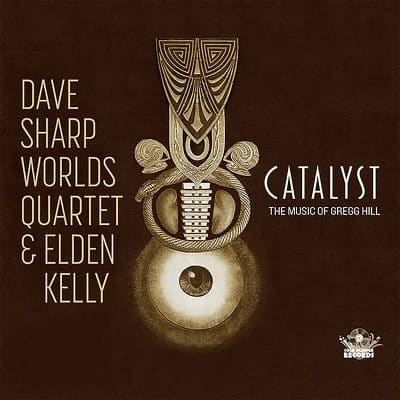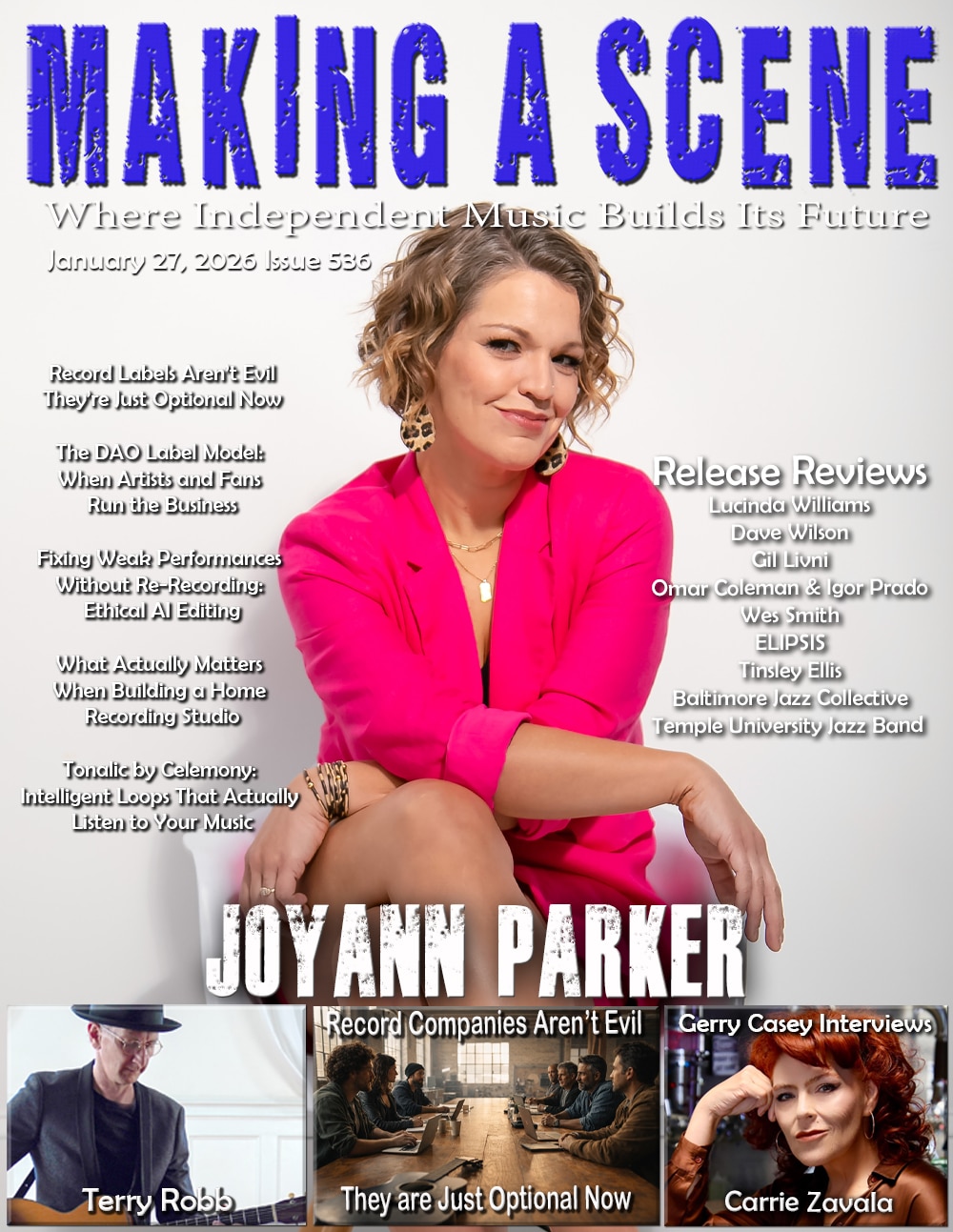Dave Sharp Worlds Quartet & Elden Kelly Catalyst – The Music of Gregg Hill
 Dave Sharp Worlds Quartet & Elden Kelly
Dave Sharp Worlds Quartet & Elden Kelly
Catalyst – The Music of Gregg Hill
Cold Plunge
How far does the music of composer Gregg Hill stretch? Readers of these pages will recall Hill’s music rendered by Michael Dease, Rodney Whitaker, Randy Napoleon, and Rick Roe, all in the genre of jazz. By the way, Dease has another forthcoming double album of Hill’s music, City Life, due on June 20th. A Google search will reveal even more artists who have covered the Michigan composer’s music. Now, with Catalyst, the Dave Sharp Worlds Quartet take Hill’s music into a world-meets-jazz direction. The connector to Hill’s music in this setting is guitarist Elden Kelly, who has long been Hill’s musical transcriptionist. You may recognize some of these tunes such as the title track and “The Stray Moonduck” from these previous releases but this instrumentation is a revelation. Sharp’s quartet is comprised of master violinist Henrik Karapetyan, oud player Igor Houwat, percussionist Mike List, with Dave Sharp on bass. Kelly adds fretted/fretless guitar, guitar synth, and bass (just one track).
Kelly, originally from Vermont, holds a Masters in Musicology from Michigan State University (thus the connection with Hill) and a Bachelors from the New Conservatory of Music. He has played with the quartet for years and took the opportunity to arrange Hill’s music with these players in mind. Kelly has a command of guitar styles ranging from classical to flamenco and his mastery of the fretless guitar evokes blues, Indian, and Eastern sounds. He states that the arranging process became almost a co-composition, involving the addition of entirely new sections, transformations of original melodies, and reimagining the tunes through the lens of different musical traditions. They tested the music during the summer of 2024 at Jazz Acona in Switzerland, with the positive audience response encouraging them to take the music to a recording studio.
Since these musicians are new to us, a few words are in order. Karapetyan hails from Armenia, has a deep classical background and an understanding of various idioms, principally Hungarian Romani music. Houwat is a Brazilian-born oud player of Lebanese descent, originally trained as a classical saxophonist before taking up the instrument to reconnect with his Lebanese ancestry. He has a wide range of influences from jazz to flamenco. List has studied Middle Eastern percussion, tabla with masters in India, and classical percussion in his home state of Michigan. Sharp, like List and Houwat, calls Michigan home but while living in San Francisco in the ‘90s he studied at the Ali Akbar College of Music to learn global music traditions and has throughout his career collaborated with recognized world music artists. Several of these members also perform with the Klezmer band Klezmephonic, including Kelly. This gave him a first-hand experience of playing with Karapetyan and consequently he injected gypsy jazz and old world arrangements into these pieces to highlight the violinist’s special talents.
Opener, the syncopated “Traveling with Gregg” incorporates exotic-sounding scales and references Indian-fusion groups like Shakti. The interplay between the oud, guitar, violin, and percussion is riveting. “Rue de Royal” was originally inspired from New Orleans but capitalizes on Karapetyan’s expertise in Hungarian-jazz-style violin imbued with oud textures. “13th Century Lion” reflects a much different tonality and tempo as the band playfully steps into a a prog-rock mode in a tune written in 5/4 or 10/8 time, depending on one’s interpretation. Both the interplay and brief solos from violin and oud are captivating once again. “Ducks Night Out” seems to harness much of what has transpired in these first three tracks, imagining a night on the two passing through various clubs whether different styles of music are playing, thus a variety of moods and shifting rhythms in the improvised solos.
The title track has strains of Latin music with a 5/4 time signature that has some similarity to Chick Corea’s music. “Savana” has West African rhythms but a sound somewhat like the Pat Metheny Group via Kelly’s guitar synth. “Cidade” is the Portugese word for city, the title otherwise reading “City Life” (which is the title of the forthcoming double album from Dease referenced previously). This version captures similar lyricism of Brazilian music without resorting to traditional samba or bossa rhythms. Instead, it reads as a chamber classical ballad piece, with Kelly soloing more prominently than in many of the others. Closer “The Stray Moonduck” appeared on Dease’s Found in Space. This version as described in the liners is characterized as a sort of “deranged tabla tango,” showcasing the skills of percussionist List.
Catalyst is an aural journey through Eastern Europe, the Middle East, and India with side trips to the continents of Africa and South America. Gregg Hill’s music stretches that far to answer the initial question posed in the opening. In short, it’s a brilliant meshing of countless musical forms.
– JIm Hynes
Buy Us a Cup of Coffee!
Join the movement in supporting Making a Scene, the premier independent resource for both emerging musicians and the dedicated fans who champion them.
We showcase this vibrant community that celebrates the raw talent and creative spirit driving the music industry forward. From insightful articles and in-depth interviews to exclusive content and insider tips, Making a Scene empowers artists to thrive and fans to discover their next favorite sound.
Together, let’s amplify the voices of independent musicians and forge unforgettable connections through the power of music
Make a one-time donation
Make a monthly donation
Make a yearly donation
Buy us a cup of Coffee!
Or enter a custom amount
Your contribution is appreciated.
Your contribution is appreciated.
Your contribution is appreciated.
DonateDonate monthlyDonate yearlyYou can donate directly through Paypal!
Subscribe to Our Newsletter
Order the New Book From Making a Scene
Breaking Chains – Navigating the Decentralized Music Industry
Breaking Chains is a groundbreaking guide for independent musicians ready to take control of their careers in the rapidly evolving world of decentralized music. From blockchain-powered royalties to NFTs, DAOs, and smart contracts, this book breaks down complex Web3 concepts into practical strategies that help artists earn more, connect directly with fans, and retain creative freedom. With real-world examples, platform recommendations, and step-by-step guidance, it empowers musicians to bypass traditional gatekeepers and build sustainable careers on their own terms.
More than just a tech manual, Breaking Chains explores the bigger picture—how decentralization can rebuild the music industry’s middle class, strengthen local economies, and transform fans into stakeholders in an artist’s journey. Whether you’re an emerging musician, a veteran indie artist, or a curious fan of the next music revolution, this book is your roadmap to the future of fair, transparent, and community-driven music.
Get your Limited Edition Signed and Numbered (Only 50 copies Available) Free Shipping Included
Discover more from Making A Scene!
Subscribe to get the latest posts sent to your email.









